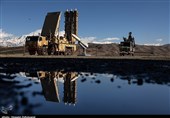Mars Rock Samples Could Bring Alien Viruses to Earth, Warns Expert (+Video)
TEHRAN (Tasnim) – A Stanford professor urged NASA to make protocols for the human Mars mission as they are concerned about alien viruses contaminating Earth.
As the first humans prepare for the Mars mission, experts warn that protocols are necessary to keep extraterrestrial pollutants from hitchhiking on space ships and astronauts when returning home from the Red Planet, the Daily Mail reported.
Stanford professor of aeronautics and astronautics Scott Hubbard said in an interview that the solution is 'planetary protection'.
Mechanical systems will have to undergo a combination of chemical cleaning and heat sterilization, while the tubes containing samples from Mars need to be treated 'as though they are the Ebola virus until proven safe.' Hubbard also suggests that astronauts must be quarantine once they touch down on our planet, as the first men who visited the moon in the Apollo mission did.
Hubbard also suggests that astronauts must be quarantine once they touch down on our planet, as the first men who visited the moon in the Apollo mission did.
NASA Administrator Jim Bridenstine announced last year that NASA is aiming to put humans on Mars sometime in the 2030s – and as early as 2035.
Although exciting, the mission could be detrimental to Earth if the space faring heroes return carrying alien pollutants.
Speaking with Stanford News Hubbard said: 'In my opinion, and that of the science community, the chance that rocks from Mars that are millions of years old will contain an active life form that could infect Earth is extremely low.'
'But, the (Mars) samples returned by (NASA) will be quarantined and treated as though they are the Ebola virus until proven safe.'
Past space missions to Mars, such as Viking I and II in the mid-1970s, used large budget rockets that were able to be sterilized using just intense heat.
However, now that rockets are being developed at a low cost at both universities and companies, like SpaceX, these small craft 'will be burdened by the cost of planetary protection.'
Hubbard notes that although heat alone is not enough to decontaminate the technology, combining the process with chemical cleaning may be effective.
The tubes that return with the samples aboard the upcoming Mars 2020 mission, which is sending NASA's Perseverance Rover, will have to 'be baked at a high temperature' be for human staff can interact with them.
'To guard against back contamination, there is a major effort to 'break the chain of contact' between the returning spacecraft and Mars rock samples,' said H ubbard.
'For example, autonomous sealing and welding techniques to create three or four levels of containment are planned.'
'In my opinion, and that of the science community, the chance that rocks from Mars that are millions of years old will contain an active life form that could infect Earth is extremely low.
'But, the samples returned by MSR will be quarantined and treated as though they are the Ebola virus until proven safe.'
Hubbard acknowledges the fact that humans cannot be cleaned like robots and looks to past protocols.
'As for humans, the Apollo astronauts from the first few moon missions were quarantined to ensure they showed no signs of illness,' he said.
'Once it was found that the moon did not pose a risk, the quarantine was eliminated. Such a procedure will undoubtedly be followed for humans returning from Mars.'
Not only are experts concerned about contaminating Earth, they also have fear of humans spreading their germs on Mars.
However, a team of researchers from Nova Southeastern University in Florida, along with colleagues W. Raquel Peixoto and Alexandre Rosado from Federal University of Rio de Janeiro suggest human microbes will initiate the process of terraforming the red planet and create an environment that can sustain life.
The team wants to develop a process that involves screening promising microbes and discarding dangerous ones prior to releasing them on Mars.
A major argument by the researchers is that the prevention of contamination is a 'near impossibility,' as the authors phrase it in the study.
However, space agencies have put specific protocols in place to prevent the contamination of other planets and experts have noted that more research needs to be done before we start polluting other worlds.
The idea of protecting celestial bodies dates back to the 1950s when the philosophy of planetary protection was created with a sole purpose of recommending and designing such protocols that protects space from Earthly microbes.
It argues that our germs can contaminate scientifically important areas of the solar system – similar to how a crime scene can be compromised if someone not involved touches evidence.
Although the idea of sterilization has been around for decades, Lopez and his team believe it is inevitable that our germs will make it to Mars and other planets.
'Mainly, microbial introduction should not be considered accidental but inevitable,' reads the paper published in FEMS Microbiology Ecology.






